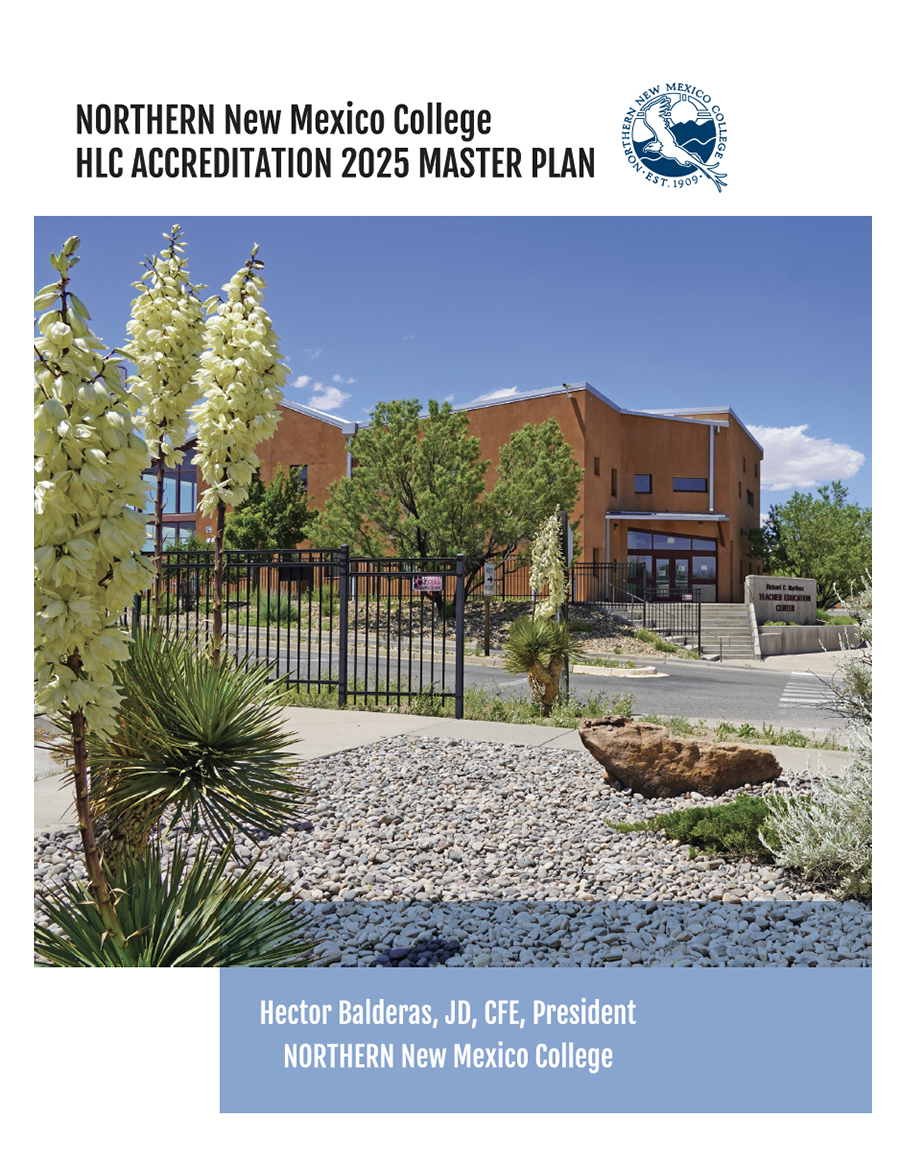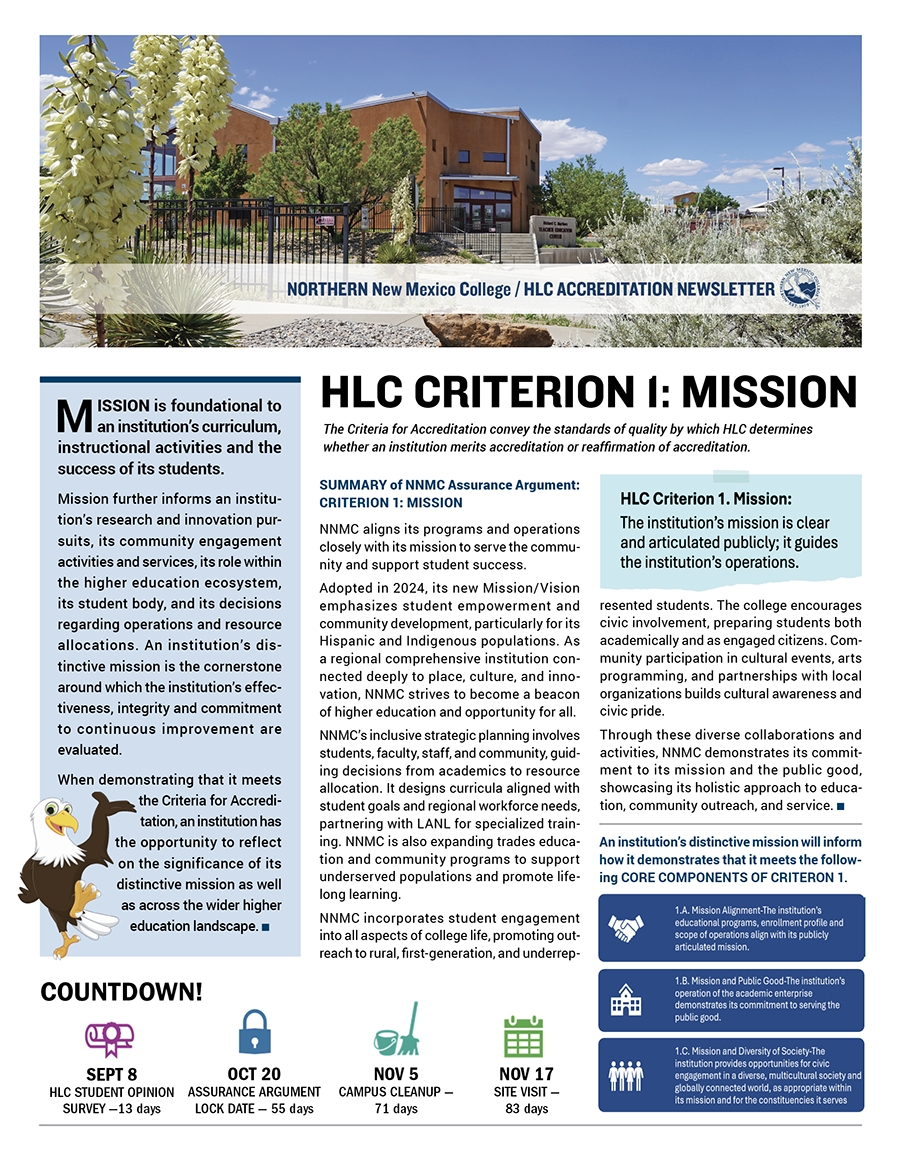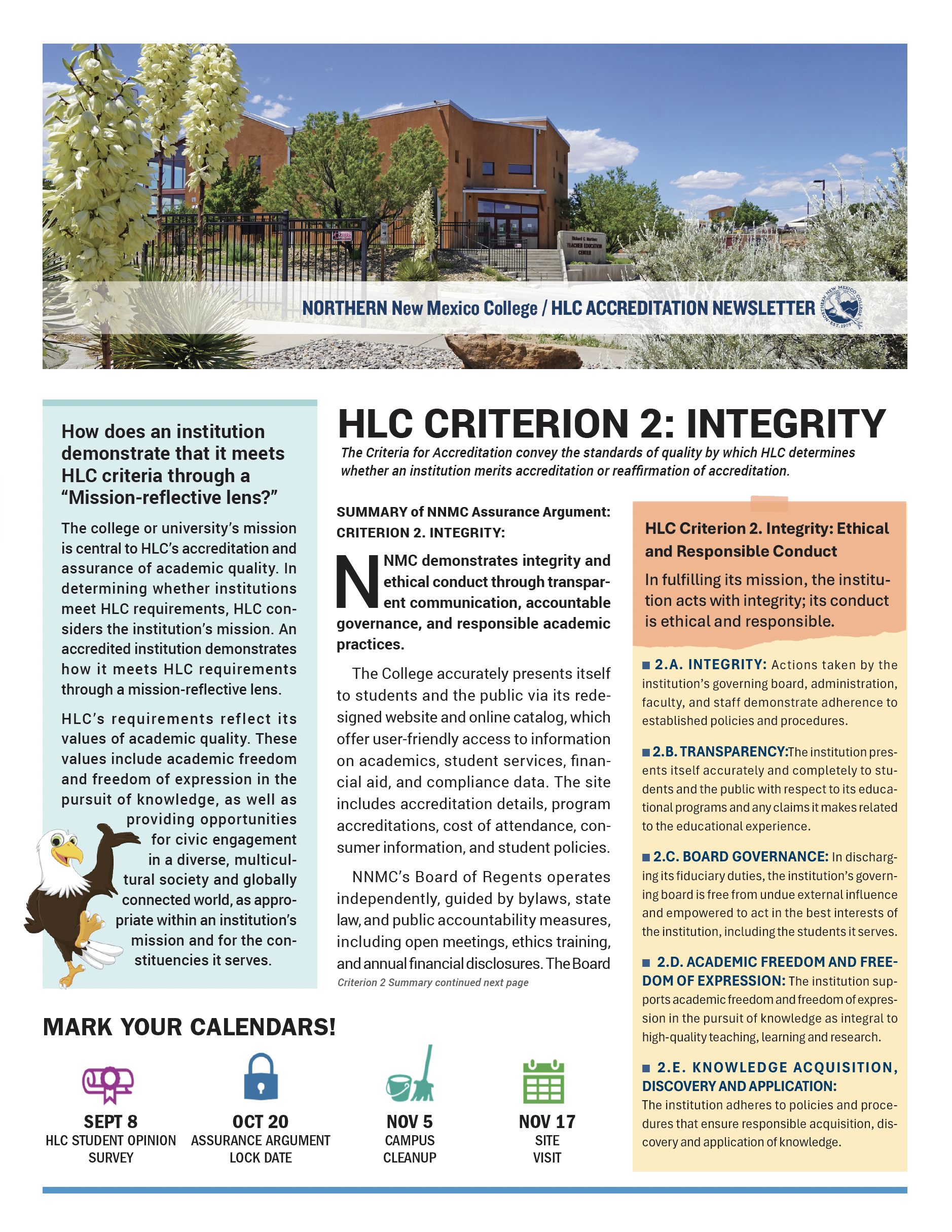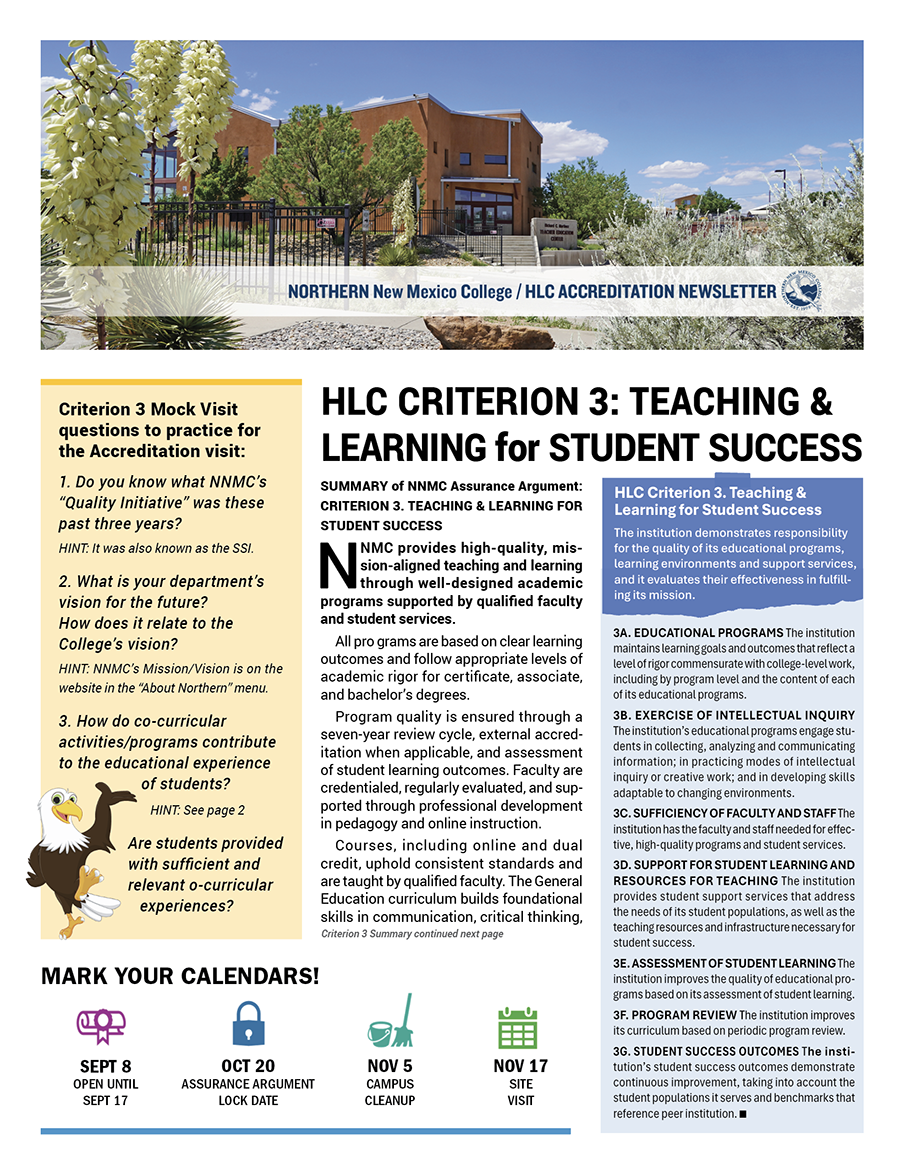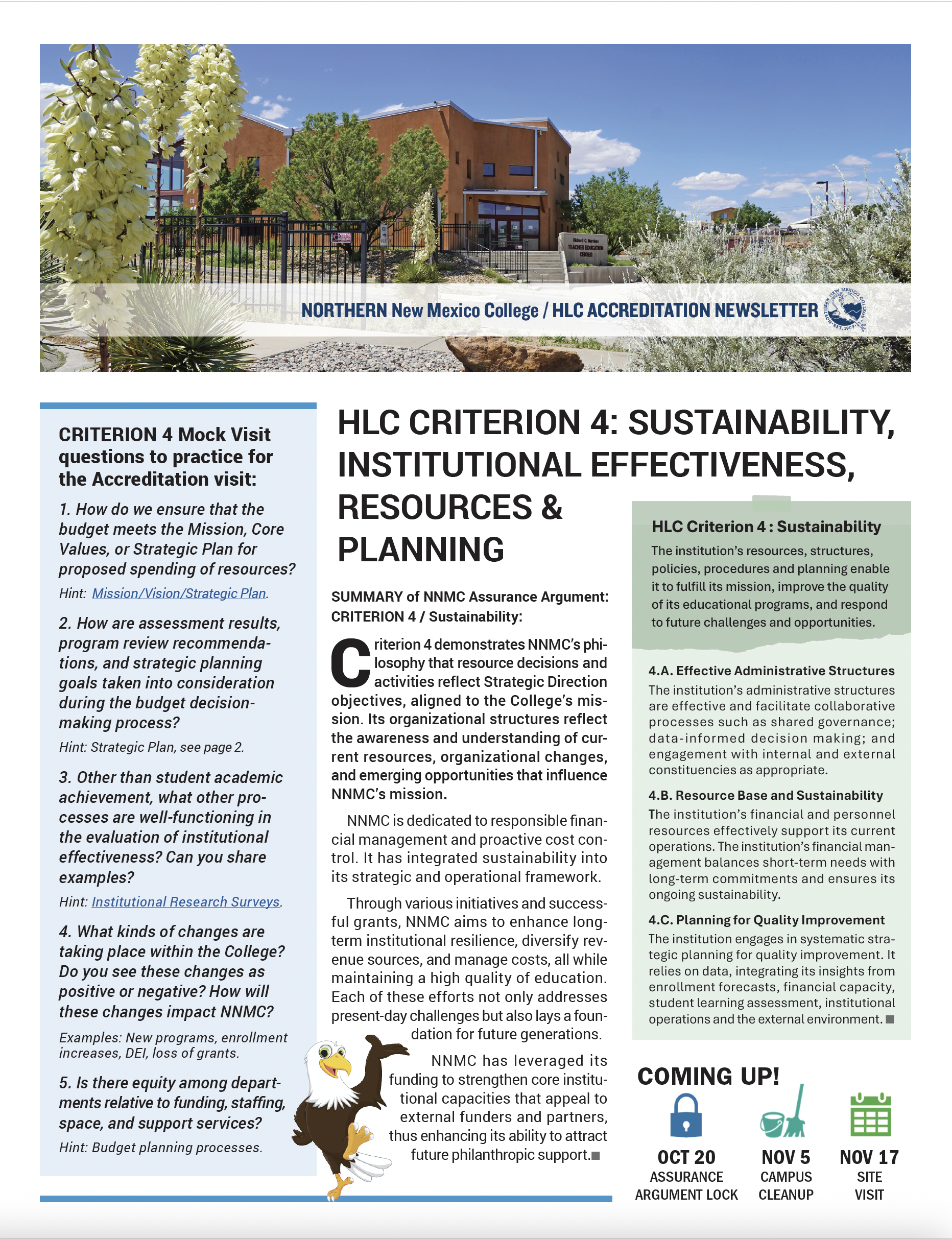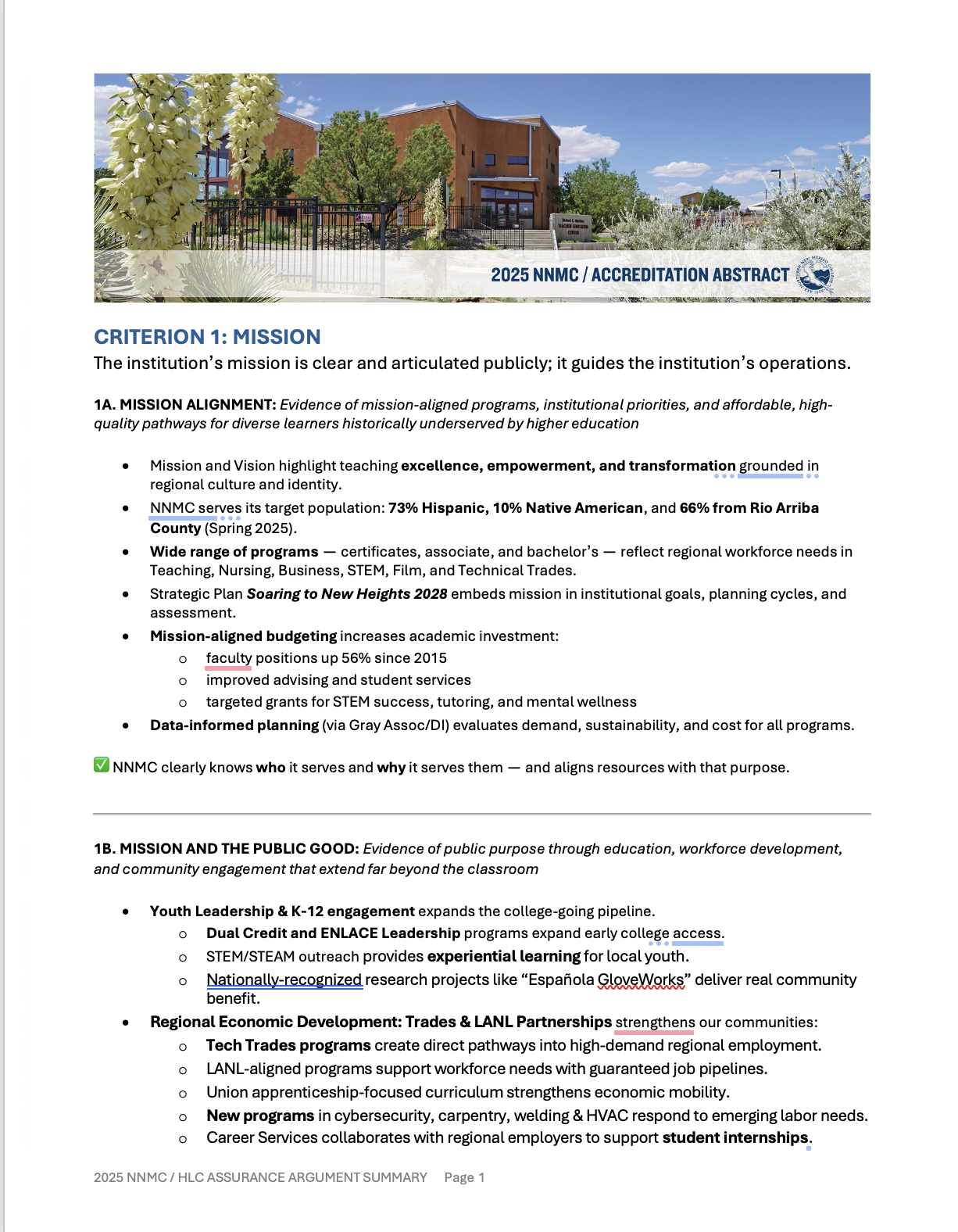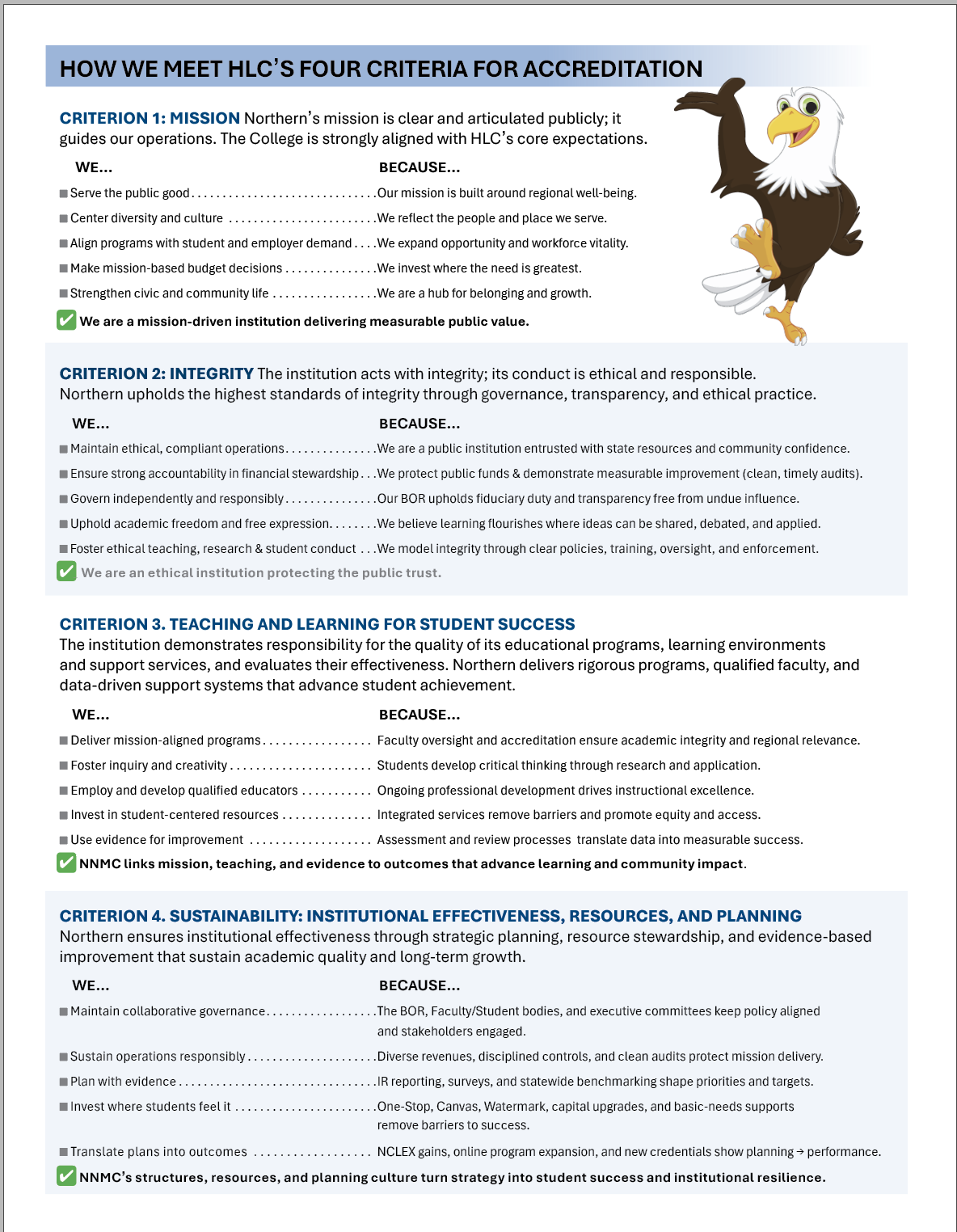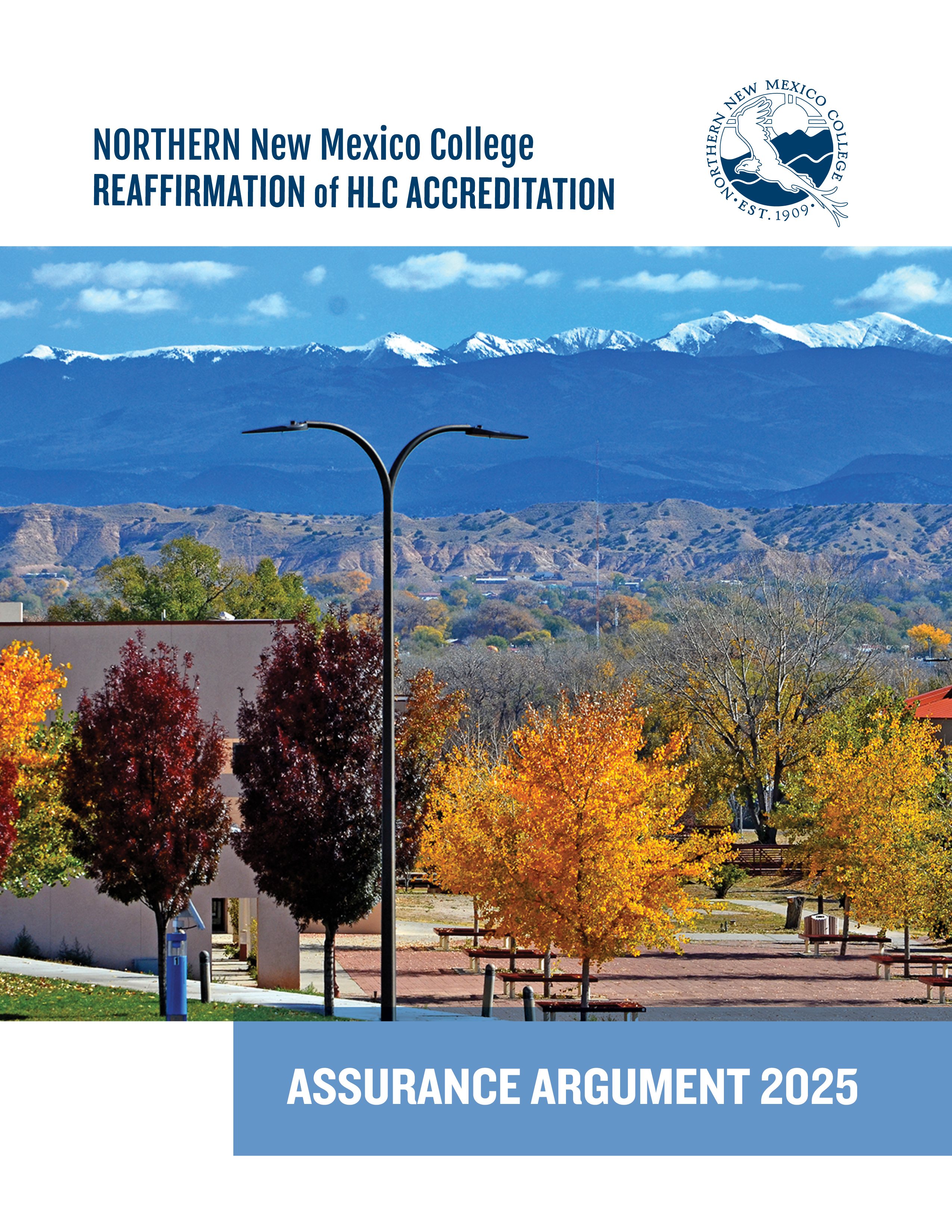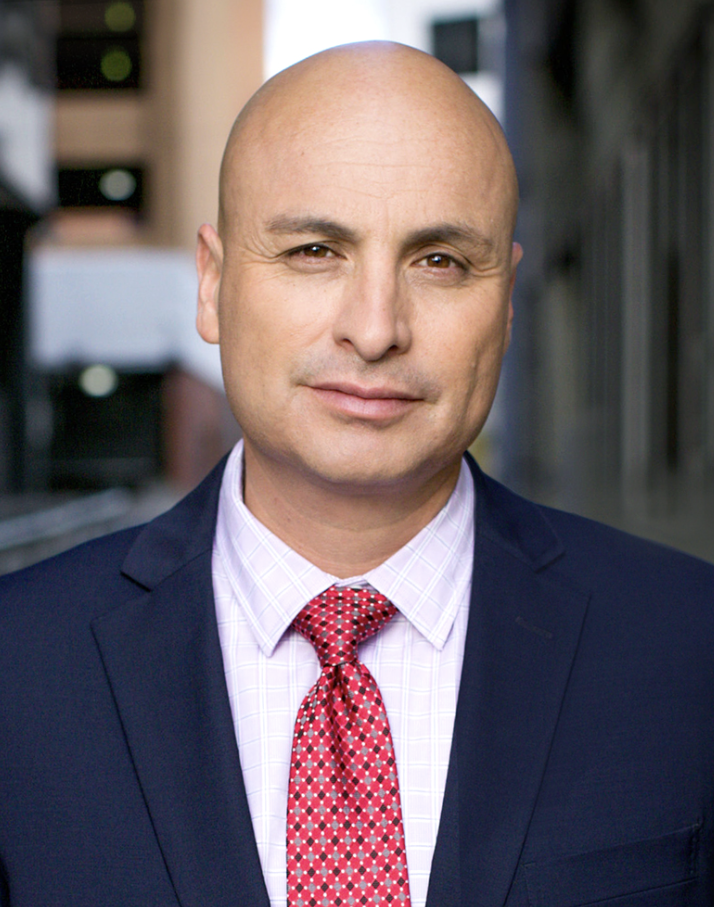HLC Accreditation 2025
On November 17-18, 2025, NNMC will host the Higher Learning Commission Peer Review
Team on campus for an Open Pathway Comprehensive Evaluation Site Visit. The purpose of the visit is to ensure NNMC is meeting the Criteria for Accreditation and pursuing continuous quality improvements.
2025 Reaffirmation of HLC Accreditation for Northern
Northern New Mexico College moved to the Open Pathways model for accreditation after our 2016 Reaffirmation of Accreditation. The Open Pathways model requires 3 reviews:
Year 4: Mid-cycle Assurance Review: In 2020, HLC-appointed peer reviewers evaluated the institution based on HLC’s Criteria for Accreditation and other requirements. The review occurred virtually, without a campus visit. Read it on our website here.
Years 5–9: Quality Initiatives: In 2024, NNMC reported our Quality Initiative after participating in the HLC Student Success Academy. The College worked to design and implement a project aimed at improving student retention and completion rates. Institutions are required to submit a project proposal between Years 5 and 7 and then report on the outcomes between Years 7 and 9. Peer reviewers evaluate both the project proposals and the outcomes reports. Read it on our website here.
Year 10: Comprehensive Evaluation for Reaffirmation of Accreditation: In November 2025 we will have our Year 10 evaluation process where HLC determines whether the institution’s accreditation should be reaffirmed. Institutions are evaluated based on HLC’s Criteria for Accreditation and other requirements. Peer reviewers review materials, visit campus, and consider feedback from students and community members. The team also reviews the institution’s compliance with certain federal requirements.
From the President
Over the coming months, as we work together to prepare for the reaffirmation of Northern’s accreditation with the Higher Learning Commission (HLC), I want to acknowledge and thank each of you for your unique contribution to making Northern a place where students realize their dreams. While our accreditation is important to validate the quality of our work, the accreditation process is also an opportunity to reflect and showcase the high quality of our work and all that we do to support our students’ success.
We have an exciting opportunity to come together and discuss our strengths, assess how we operate, and identify areas where we can continue to grow. I encourage you to reflect on Northern’s mission, vision, and values, as this process at its core is about demonstrating how we express those principles every day through our work.
Thank you again for your shared commitment and for all that you do. Together we will show that not only does Northern satisfy the standards for accreditation, but that we go above and beyond those in our support of our students and our community.
Respectfully,
Hector Balderas, JD, CFE
Comprehensive Evaluation Visit Agenda
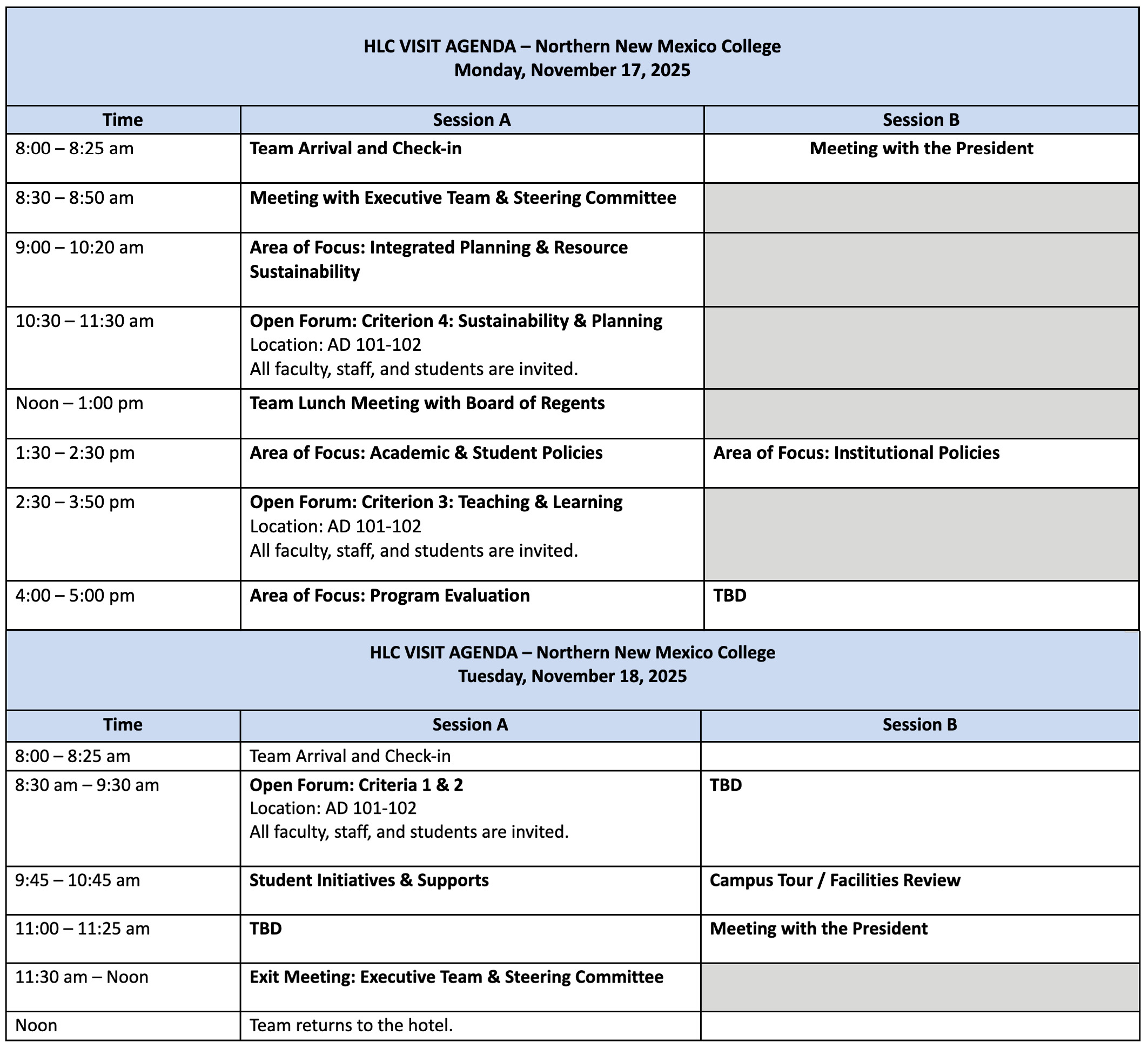
Criteria & Core Components
Mission is foundational to an institution’s curriculum, instructional activities and the success of its students. Mission further informs an institution’s research and innovation pursuits, its community engagement activities and services, its role within the higher education ecosystem, its student body, and its decisions regarding operations and resource allocations. An institution’s distinctive mission is the cornerstone around which the institution’s effectiveness, integrity and commitment to continuous improvement are evaluated.
When demonstrating that it meets the Criteria for Accreditation, an institution has the opportunity to reflect on the significance of its distinctive mission as well as across the wider higher education landscape. Against these backdrops, the institution is able to speak to its current state, aspirations and plans for the future.
Specifically, the distinctiveness of an institution’s mission may inform the strategies it adopts and the evidence it provides to demonstrate that it meets each Criterion and Core Component. In preparing for a review, an institution may provide evidence relevant to additional topics related to a Core Component beyond those specified in any HLC resource document. During the review process, peer reviewers will determine whether an institution meets the Criteria and Core Components on the basis of such evidence.
CRITERION 1 / MISSION The institution’s mission is clear and articulated publicly; it guides the institution’s operations.
CRITERION 2 / INTEGRITY: Ethical and Responsible Conduct In fulfilling its mission, the institution acts with integrity; its conduct is ethical and responsible.
CRITERION 3 / TEACHING & LEARNING for Student Success The institution demonstrates responsibility for the quality of its educational programs, learning environments and support services, and it evaluates their effectiveness in fulfilling its mission. The rigor and quality of each educational program is consistent regardless of modality, location or other differentiating factors.
CRITERION 4 / SUSTAINABILITY: Institutional Effectiveness, Resources and Planning The institution’s resources, structures, policies, procedures and planning enable it to fulfill its mission, improve the quality of its educational programs, and respond to future challenges and opportunities.
President's Accreditation Advisory Committee
NNMC HLC REPRESENTATIVES
- Hector Balderas, JD, CFE / Chief Executive Officer
- Carmella Sanchez, MS / ALO & Assurance System Coordinator
- René Vellanoweth, PhD / Provost & Chief Academic Officer
- Theresa Storey / Chief Financial Officer
- Christian Gomez / Location Coordinator
FACULTY LEADERS
- Lori Baca, D.B.A. / Chair, Business Administration
- Lori Franklin, MA / Chair, Language & Letters
- Ashis Nandy, PhD / Chair, Engineering & Technology
- Sushmita Nandy, PhD / Chair, Biology, Chemistry, Env. Science
- David Torres, PhD / Associate Professor, Math & Physical Science and Assessment Coordinator
- Ellen Trabka, MSN / Chair, Nursing & Health Sciences
EXECUTIVE TEAM LEADERS
- René Vellanoweth, PhD / Provost & Chief Academic Officer
- Matt Baca, JD / General Counsel
- Scott Stokes / Chief Information Officer
- Theresa Storey / Chief Financial Officer
STAFF LEADERS
- Sondra Adams, MA / Director, Financial Aid
- Kristy Alton, MA / Director, Title V
- Tobe Bott Lyons, PhD / Director, Upward Bound
- Maria Cedillo / Senior Project Manager, Database Admin
- Emma Hashman, MA / Director, Admissions
- Sandy Krolick, MA / Creative Director, Comms/Mktg
- Carmella Sanchez, MS / Director, Institutional Research
- Milam Shah, MA / Communications Coordinator

